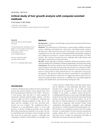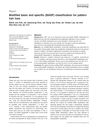 4 citations,
December 2019 in “Skin appendage disorders”
4 citations,
December 2019 in “Skin appendage disorders” Using Platelet-Rich Plasma injections for male-pattern baldness didn't significantly improve hair growth.
 60 citations,
June 2019 in “Ageing Research Reviews”
60 citations,
June 2019 in “Ageing Research Reviews” Fat from the body can help improve hair growth and scars when used in skin treatments.
 September 2023 in “International Journal of Trichology”
September 2023 in “International Journal of Trichology” Adipose-derived stem cells may help with hair loss, but more research is needed.
[object Object]  26 citations,
July 2021 in “Frontiers in Cell and Developmental Biology”
26 citations,
July 2021 in “Frontiers in Cell and Developmental Biology” The review suggests that a special cell-derived treatment shows promise for various skin conditions and hair growth but needs more research for confirmation.
2 citations,
December 2021 in “Dermatology and therapy” Microneedling helps with hair loss, especially with 5% minoxidil, but more high-quality research is needed.
Stem cell treatments show promise for hair loss but need more research.
 1 citations,
May 2021 in “Journal of Cosmetic Dermatology”
1 citations,
May 2021 in “Journal of Cosmetic Dermatology” Cosmetic foam product reduces hair loss and increases hair density in men.
 179 citations,
March 2005 in “British Journal of Dermatology”
179 citations,
March 2005 in “British Journal of Dermatology” Oral antiandrogens effectively treat female hair loss, with better results in higher hair loss grades.
 40 citations,
April 2006 in “Journal of the European Academy of Dermatology and Venereology”
40 citations,
April 2006 in “Journal of the European Academy of Dermatology and Venereology” The Trichoscan system was found to be inaccurate for measuring hair growth, needing better software to be useful.
 May 2021 in “Lasers in Surgery and Medicine”
May 2021 in “Lasers in Surgery and Medicine” Minoxidil and photobiomodulation together improve hair growth better than minoxidil alone.
 136 citations,
April 2016 in “Dermatologic Surgery”
136 citations,
April 2016 in “Dermatologic Surgery” PRP treatment helps hair growth and density in androgenetic alopecia patients.
 83 citations,
March 2015 in “International Journal of Dermatology”
83 citations,
March 2015 in “International Journal of Dermatology” ADSC-CM treatment improved hair density and thickness in women with hair loss, safely and effectively.
 81 citations,
August 2011 in “Journal of The American Academy of Dermatology”
81 citations,
August 2011 in “Journal of The American Academy of Dermatology” Latanoprost 0.1% may effectively treat hair loss.
 36 citations,
June 2014 in “International Journal of Dermatology”
36 citations,
June 2014 in “International Journal of Dermatology” Dutasteride helps hair growth in those unresponsive to finasteride, but may cause more sexual dysfunction.
 35 citations,
April 2014 in “American Journal of Medical Genetics”
35 citations,
April 2014 in “American Journal of Medical Genetics” Boys with less severe EDA mutations in XLHED have milder symptoms and better sweat and hair production.
 30 citations,
January 2000 in “Dermatologic Clinics”
30 citations,
January 2000 in “Dermatologic Clinics” Finasteride and minoxidil are effective FDA-approved treatments for androgenetic alopecia.
 25 citations,
May 2020 in “Stem Cells Translational Medicine”
25 citations,
May 2020 in “Stem Cells Translational Medicine” ADSC-CE treatment safely increases hair density and thickness in androgenetic alopecia patients.
 23 citations,
October 2018 in “Expert Opinion on Drug Safety”
23 citations,
October 2018 in “Expert Opinion on Drug Safety” Consider benefits and risks of new alopecia treatments for safety.
 21 citations,
May 2016 in “The Cochrane library”
21 citations,
May 2016 in “The Cochrane library” Topical minoxidil helps treat female pattern hair loss, but more research needed for other treatments.
 16 citations,
July 2018 in “Dermatologic Surgery”
16 citations,
July 2018 in “Dermatologic Surgery” iL-PRF treatment improves hair growth for androgenetic alopecia.
 8 citations,
March 2021 in “Medicina-lithuania”
8 citations,
March 2021 in “Medicina-lithuania” PRP treatment may promote hair growth and improve hair density in women with AGA, but more research is needed.
[object Object]  5 citations,
January 2020 in “Journal of Dermatology”
5 citations,
January 2020 in “Journal of Dermatology” Temporal hair loss relates to overall scalp hair loss in women.
 4 citations,
August 2013 in “Expert Review of Dermatology”
4 citations,
August 2013 in “Expert Review of Dermatology” Updated treatments for female hair loss include minoxidil, antiandrogens, hair transplants, and light therapy.
 2 citations,
June 2019 in “International Journal of Dermatology”
2 citations,
June 2019 in “International Journal of Dermatology” The modified hair loss classification is more detailed but less user-friendly.
 2 citations,
October 2017 in “Journal of The American Academy of Dermatology”
2 citations,
October 2017 in “Journal of The American Academy of Dermatology” Focal atrichia helps diagnose female pattern hair loss.
 2 citations,
June 2011 in “Expert Review of Dermatology”
2 citations,
June 2011 in “Expert Review of Dermatology” Female pattern hair loss involves thinning hair on crown and frontal scalp, diagnosed by hair ratio, and treated with minoxidil, antiandrogens, or hair transplantation.
 March 2024 in “International journal of pharmaceutical sciences and drug research”
March 2024 in “International journal of pharmaceutical sciences and drug research” Androgenetic alopecia is influenced by various factors and can be treated with medications, procedures, and non-drug methods.
 February 2024 in “International journal of biology, pharmacy and allied sciences”
February 2024 in “International journal of biology, pharmacy and allied sciences” Plant-based treatments can effectively and safely treat hair loss.
 December 2022 in “Scholars journal of applied medical sciences”
December 2022 in “Scholars journal of applied medical sciences” Dutasteride 0.5mg improves hair growth in 78% of people with hair loss, but may cause sexual problems in some.
40 citations,
May 2018 in “PubMed” Nutrafol® Women's Capsules safely and effectively promote hair growth in women with thinning hair.



























